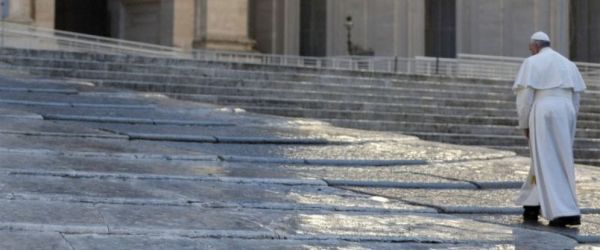Jesus’ parabolic discourse groups together seven parables in the 13th chapter of the Gospel of Matthew, and concludes with today’s three parallel stories: the hidden treasure (v. 44), the fine pearl (vv. 45-46) and the fishing net (vv. 47-48). I will pause on the first two which highlight the protagonists’ decision to sell everything in order to acquire what they have found. The first case has to do with a farmer who casually happens upon a hidden treasure in the field he is working. As the field is not his property, he must purchase it in order to take possession of the treasure: he therefore decides to risk all his possessions so as not to lose that truly exceptional opportunity. In the second case, there is a merchant of precious pearls; as an expert, he has spied a pearl of great value. He too decides to wager everything on that pearl, to the point of selling all the others.
These parallel stories highlight two characteristics regarding possession of the Kingdom of God: searching and sacrifice. It is true that the Kingdom of God is offered to all — it is a gift, it is a present, it is a grace — but it does not come on a silver platter: it requires dynamism; it is about searching, journeying, working hard. The attitude of searching is the essential condition for finding. The heart must burn with the desire to reach the valuable good, that is, the Kingdom of God which is made present in the person of Jesus. He is the hidden treasure; he is the pearl of great value. He is the fundamental discovery who can make a decisive change in our lives, filling it with meaning.
Faced with the unexpected discovery, both the farmer and the merchant realize that they are facing a unique opportunity which should not be missed; hence, they sell all that they own. Assessing the inestimable value of the treasure leads to a decision that also implies sacrifice, detachment and renunciation. When the treasure and the pearl are discovered, that is, when we have found the Lord, we must not let this discovery become barren, but rather sacrifice everything else in order to acquire it. It is not a question of disdaining the rest but of subordinating them to Jesus, putting him in first place; grace in first place. The disciple of Christ is not one who has deprived himself of something essential; he is one who has found much more: he has found the complete joy that only the Lord can give. It is the evangelical joy of the sick who have been healed; of the pardoned sinners, of the thief for whom the doors of heaven open.
The joy of the Gospel fills the heart and the entire life of those who encounter Jesus. Those who allow themselves to be saved by him are freed from sin, sadness, inner emptiness and isolation. With Jesus Christ, joy is always born and reborn (cf. Apostolic Exhortation Evangelii Gaudium, n. 1). Today we are called to contemplate the joy of the farmer and the merchant in the parables. It is the joy of each of us when we discover the closeness and the comforting presence of Jesus in our lives. A presence which transforms the heart and opens us to the needs and the welcoming of our brothers, especially the weakest.
Let us pray for the intercession of the Virgin Mary so that each of us may know how to bear witness, in daily words and gestures, to the joy of having found the treasure of the Kingdom of God, that is, the love that the Father has given us through Jesus.
[Pope Francis, Angelus 30 July 2017]












